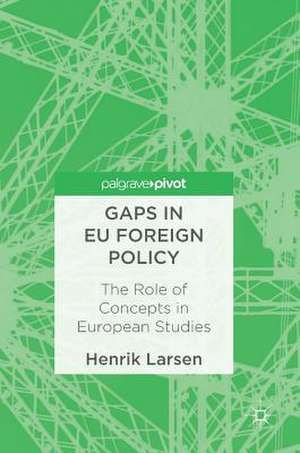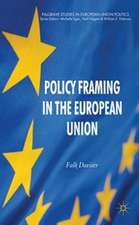Gaps in EU Foreign Policy: The Role of Concepts in European Studies
Autor Henrik Larsenen Limba Engleză Hardback – 24 mar 2017
This book argues that theories of European foreign policy are performative: they create the objects they analyse. In this text, Larsen outlines the performativity approach to the role of theories based on the work of Derrida and goes on to examine the performative role of Christopher Hill's concept of Capability-Expectations Gap in the study of European foreign policy. Through examples from relevant literature, Larsen not only demonstrates how this concept sets up standards for the EU as a foreign policy actor (that are not met by most other international actors) but also shows how this curtails analysis of EU foreign policy. The author goes on to discuss how the widespread use of the concept of ‘gap' affects the way in which EU foreign policy has been studied; and that it always produces the same result: the EU is an unfulfilled actor outside the realm of “normal” actors in IR. This volume offers new perspectives on European foreign policy research and advice and serves as aninvaluable resource for students of EU foreign policy and, more broadly, European Studies.
| Toate formatele și edițiile | Preț | Express |
|---|---|---|
| Paperback (1) | 409.63 lei 43-57 zile | |
| Palgrave Macmillan UK – 21 iul 2018 | 409.63 lei 43-57 zile | |
| Hardback (1) | 415.77 lei 43-57 zile | |
| Palgrave Macmillan UK – 24 mar 2017 | 415.77 lei 43-57 zile |
Preț: 415.77 lei
Nou
Puncte Express: 624
Preț estimativ în valută:
79.57€ • 82.56$ • 66.50£
79.57€ • 82.56$ • 66.50£
Carte tipărită la comandă
Livrare economică 17-31 martie
Preluare comenzi: 021 569.72.76
Specificații
ISBN-13: 9781349951659
ISBN-10: 134995165X
Pagini: 96
Ilustrații: IX, 98 p. 1 illus.
Dimensiuni: 148 x 210 x 8 mm
Greutate: 0.29 kg
Ediția:1st ed. 2017
Editura: Palgrave Macmillan UK
Colecția Palgrave Macmillan
Locul publicării:London, United Kingdom
ISBN-10: 134995165X
Pagini: 96
Ilustrații: IX, 98 p. 1 illus.
Dimensiuni: 148 x 210 x 8 mm
Greutate: 0.29 kg
Ediția:1st ed. 2017
Editura: Palgrave Macmillan UK
Colecția Palgrave Macmillan
Locul publicării:London, United Kingdom
Cuprins
1. Introduction.- 2.The Performativity of Theories.- 3. The Capability-Expectation Gap: A Double Reading.- 4. The Performativity of the Capability-Expectations Gap.- 5. Implications of the Gap Discourse for the Study of (European) Foreign Policy and European Studies.
Notă biografică
Henrik Larsen is Professor MSO and holds the Jean Monnet Chair in European Foreign and Security Policy Integration in the Department of Political Science at the University of Copenhagen, Denmark. His previous books include Discourse Analysis and Foreign Policy: France, Britain and Europe (1997), The ESDP and the Nordic Countries (with N. Græger and H. Ojanen, 2002) and Analysing the Foreign Policy of Small States in the EU: the Case of Denmark (2005).
Textul de pe ultima copertă
This book argues that theories of European foreign policy are performative: they create the objects they analyse. In this text, Larsen outlines the performativity approach to the role of theories based on the work of Derrida and goes on to examine the performative role of Christopher Hill's concept of Capability-Expectations Gap in the study of European foreign policy. Through examples from relevant literature, Larsen not only demonstrates how this concept sets up standards for the EU as a foreign policy actor (that are not met by most other international actors) but also shows how this curtails analysis of EU foreign policy. The author goes on to discuss how the widespread use of the concept of ‘gap' affects the way in which EU foreign policy has been studied; and that it always produces the same result: the EU is an unfulfilled actor outside the realm of “normal” actors in IR. This volume offers new perspectives on European foreign policy research and advice and serves as an invaluable resource for students of EU foreign policy and, more broadly, European Studies.
Caracteristici
Offers new way of looking at the role of theories on European foreign policy Analyses the important role of the gap concept in theories on European foreign policy including the Capability-Expectations Gap Addresses the broader academic debate about how theories on European integration affect the analysis of the EU
















